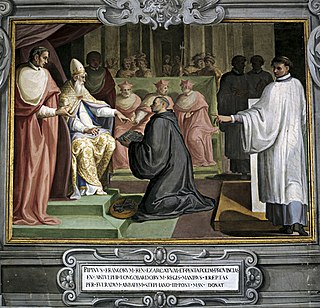Related Research Articles
Primate is a title or rank bestowed on some important archbishops in certain Christian churches. Depending on the particular tradition, it can denote either jurisdictional authority or (usually) ceremonial precedence.
JohannesBusch was a major reformer and provost of a community of Canons Regular. He was associated with the Brethren of the Common Life.
Clandestinity is a diriment impediment in the canon law of the Roman Catholic Church. It invalidates a marriage performed without the presence of three witnesses, one of whom must be a priest or a deacon.

According to Catholic theology, the sacraments of the Catholic Church can be described in their matter and form.
A nomocanon is a collection of ecclesiastical law, consisting of the elements from both the civil law and the canon law. Nomocanons form part of the canon law of the Eastern Catholic Churches and of the Eastern Orthodox Church.
Saint Aunarius (Aunacharius) (French: Aunaire, Aunachaire, Anachaire) (c.540–c.603) was bishop of Auxerre during the 6th century.

Berengar Fredol or Bérenger Frédol was a French canon lawyer and Cardinal-Bishop of Frascati.

Josef Fessler (1813–1872) was Roman Catholic Bishop of Sankt Pölten in Austria, a secretary of the First Vatican Council and an authority on patristics.

Johannes von Geissel was a German Catholic Archbishop of Cologne and Cardinal from the Electorate of the Palatinate.
Piligrim was Bishop of Passau. Piligrim was ambitious, but also concerned with the Christianization of Hungary.
Franz Michael Permaneder was a German canon lawyer.
The canon law of the Roman Catholic Church recognizes various meanings of the term emancipation.

Papal appointment was a medieval method of selecting the Pope. Popes have always been selected by a council of Church fathers, however, Papal selection before 1059 was often characterized by confirmation or nomination by secular European rulers or by the preceding pope. The later procedures of the Papal conclave are in large part designed to prohibit interference of secular rulers, which to some extent characterized the first millennium of the Roman Catholic Church, e. g. in practices such as the creation of crown-cardinals and the claimed but invalid jus exclusivae. Appointment may have taken several forms, with a variety of roles for the laity and civic leaders, Byzantine and Germanic emperors, and noble Roman families. The role of the election vis-a-vis the general population and the clergy was prone to vary considerably, with a nomination carrying weight that ranged from nearly determinative to merely suggestive, or as ratification of a concluded election.
There have been several synods of Mâcon, provincial church councils held in the city of Mâcon, then the seat of a diocese.

From 756 to 857, the papacy shifted from the influence of the Byzantine Empire to that of the kings of the Franks. Pepin the Short, Charlemagne, and Louis the Pious had considerable influence in the selection and administration of popes. The "Donation of Pepin" (756) ratified a new period of papal rule in central Italy, which became known as the Papal States.
Episcopal Intercession is the right of a church official to intercede on behalf of a criminal.
A periodeutes, sometimes anglicized periodeut, was an itinerant priest in various Eastern Christian churches.

The Diocese of Castabala is a titular see in Turkey.
References
- ↑ Herbermann, Charles, ed. (1913). . Catholic Encyclopedia . New York: Robert Appleton Company.
- ↑ Schuler, Matthias (1947). "Zum 1200jähr. Jubiläum des fränkischen Generalkonzils vom Jahre 747. Der höhepunkt der Reformtätigkeit des hl. Bonifatius". Trierer Theologische Zeitschrift . 56: 362–70.
 This article incorporates text from a publication now in the public domain : Herbermann, Charles, ed. (1913). "Councils of Auxerre". Catholic Encyclopedia . New York: Robert Appleton Company.
This article incorporates text from a publication now in the public domain : Herbermann, Charles, ed. (1913). "Councils of Auxerre". Catholic Encyclopedia . New York: Robert Appleton Company.